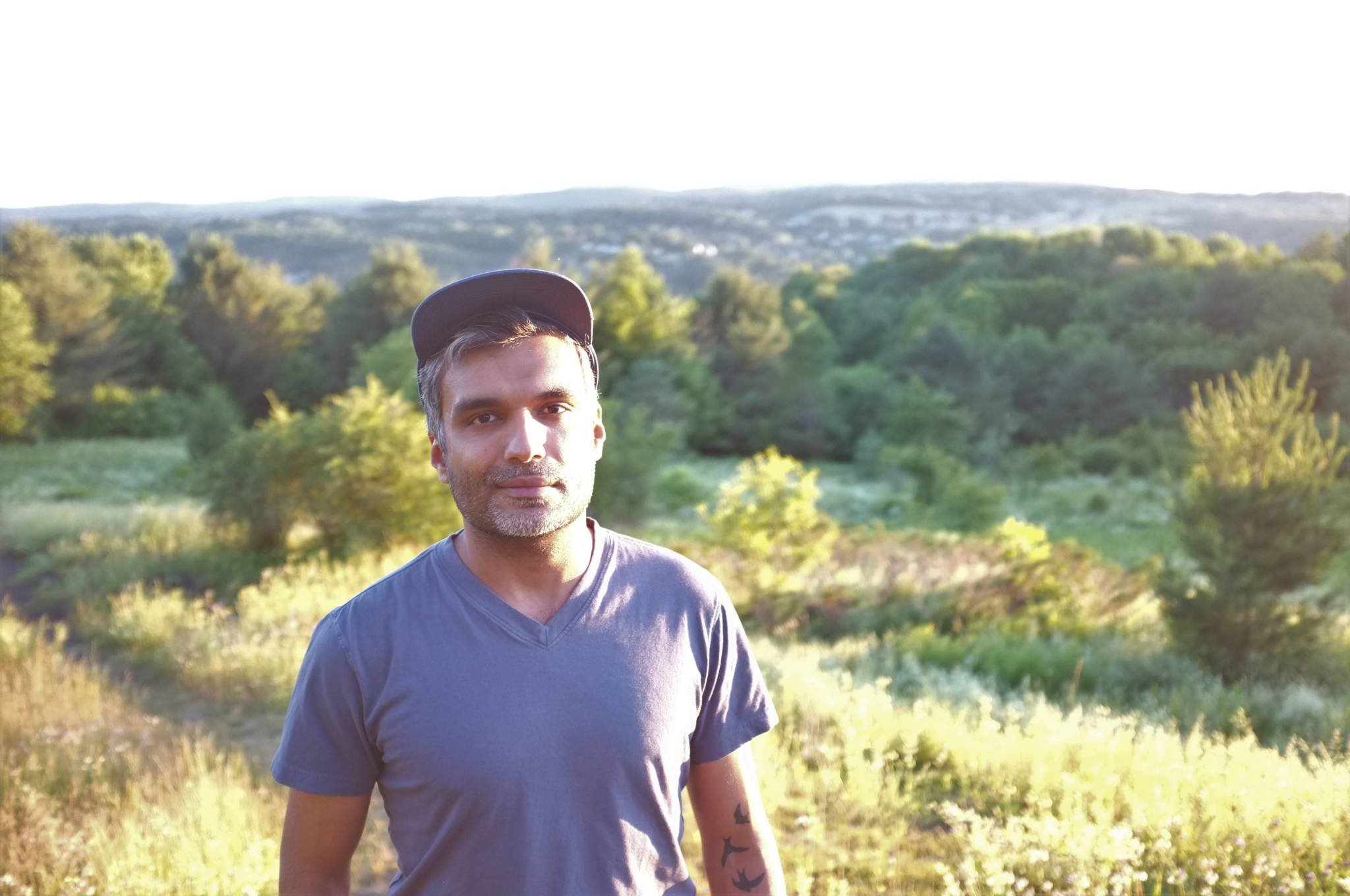An Interview with 350VT Volunteer Siddhesh Mukerji
By Claire Greenburger
Claire Greenburger is the 350Vermont Media and Communications Fellow for Summer 2022. Claire is a Middlebury College student, studying environmental justice and creative writing.
“I would rather lose having tried than not try.” – Siddhesh Mukerji
Can you tell me a little bit about yourself? Where in Vermont do you live, and how long have you lived here?
I live in Barre, but my wife and I have plans to move to Winooski shortly. I’ve only been in Vermont for a couple years. I moved here for my job. I’m an Assistant Professor of Social Work at the University of Vermont.
What’s something that you love about Vermont?
The thing that came immediately to mind is stargazing. I’m into astronomy, and Vermont has some pretty dark skies for the East Coast. I love being able to go to the Northeast Kingdom and spend an evening out there with a telescope.
How is climate change impacting your life in Vermont, whether that be on an emotional or psychological level?
I would say, living in Vermont, it’s more of a psychological impact, feeling concerned for people who are more physically and psychologically impacted. Living in Vermont is its own sort of privilege that shields us from what a lot of other folks are experiencing in other parts of the world.
And so, feeling sadness that a lot of other people are experiencing fires, floods, and famine, as well as exposure to toxic conditions, poor air quality, and other injustices that they’ve been experiencing for a long time, even before the climate crisis was understood in the way that it is now.
But I feel a sense of responsibility to try to be useful. So those are the things that I feel: sadness, urgency, responsibility, and also, gratitude––I feel gratitude that there are people like the folks at 350 who are invested in this work and are really devoting their lives to doing something about it.
Do you feel like that sense of fear has changed a lot in your lifetime? Because for me, I’m 21, so I’ve grown up with an awareness of climate change. And my climate anxiety has definitely gotten worse as I’ve gotten older and come to understand what the climate crisis really means, but I don’t remember a time without that fear.
Yeah, it has. I grew up before climate change was as recognized as it is now. There were people who recognized [the climate crisis], but they were isolated voices, and it was easy to tune them out. The issue has [now] become part of public consciousness. And I can definitely remember a time when it wasn’t on my mind and when I didn’t feel fear and despair.
I wish that I had known more earlier.
What motivated you to first get involved with 350? Why did you feel like you needed to take action on climate change?
It’s something I’ve been upset about for a long time, but I didn’t feel like I could do anything about it until I met a friend in Chicago who was volunteering with 350 there. It was the first time that I saw someone whom I know, doing something about climate change, and it was kind of a revelation. I used to think, “This is an issue for policymakers and scientists.” And it’s ironic because I’m a social worker, and I’ve taken up the role of activist in various ways for quite a while, but it just didn’t seem like something I could get involved in until I became aware of 350’s work.
And so, when I moved to Vermont, I was eager to get involved with 350. I had the naive sense, as a lot of people who move to Vermont probably do, that this is a place with progressive environmental legislation and that people are all on the same page when it comes to environmental justice and reducing fossil fuel use and so on. But I was eager to get involved with 350’s work, and I’m still pleased to be involved because I think that they’re one of the organizations that’s doing the most concrete work.
How did you first reach out?
I first reached out to Julie Macuga, the former Lead Organizer. I was just trying to figure out what I can do. I then started attending some of the workshops that Sonia orchestrates and the Burlington node meetings. I appreciated the people I met, and even though a lot of the conversation about climate change was familiar to me, it helped me become more familiar with the localized aspects of the issue.
What is your role in 350Vermont? Can you tell me about a specific project or action you are working on or have worked on for 350?
[I am] a general volunteer, helping out with certain campaigns. Last year, we were trying to get postcards signed for several pieces of legislation to get pushed forward for the Climate Action Plan, [which also involved] phone banking, calling people up asking them to call their legislators, and talking with legislators.
I also took part in node activities here in Central Vermont. A good word to describe our node is aspirational. We don’t have that many people, so it feels like we’re constantly trying to figure out what we’re about, but it’s been fun to meet people in that process. And I have enjoyed the relationships that have come with that.
More recently, I’ve taken part in the communications group that just began with Roger White from Middlebury, Marisa Keller from Montpelier, and a few other folks. I’ve really enjoyed that because it feels discreet; it feels like we have something to offer.
Related to that, I’m speaking with Carter [350VT Lead Fundraiser] about starting a podcast, which would try to make environmental issues and social issues related to the environment more understandable for folks who feel like they don’t have a role––for people who care about the issue but don’t know what to do.
What do you see as the most important direction or point of focus for the climate justice movement right now? Where do you think 350 should be directing its attention and efforts?
One thing that I think is very important, and also difficult, is for the climate movement to take political action while simultaneously depoliticizing our climate. What I mean is that, currently, climate and the environment are political issues. So, we have to engage as many people as possible from all backgrounds to push for policies that protect the environment, protect human rights, and so on.
At the same time, I think it’s vital that we shift this conversation out of the realm of partisan politics and into the realm of what impacts every person and all of life on this planet. I think of this sometimes when I see people pulling over on the road when an ambulance is coming by. When an ambulance is approaching, we don’t think about which political party we belong to or which political party the person in the ambulance belongs to. We pull over because we know we need to act for the sake of the greater good. It’s a message that’s clear and accepted in our society. In the same way, I’d like for us to have this conversation in a way that makes it about all of us “pulling over,” in different ways according to our situation, since the Earth, itself, is in the ambulance right now.
For 350Vermont, my hope is that we get more people involved.
There are a lot of folks who do care about the environment in various ways, but because of politics as they exist these days, they think that there’s no place for them in the environmental movement––that it’s a “left-wing, liberal, progressive thing,” and that it has nothing to do with farmers, low-income folks, people working normal jobs and living normal life, and so on.
And I think that that’s a really, really, really damaging message. We need to convey our message in a way that makes it about every single person and everyone’s future and their kids’ futures and their loved ones’ futures. Not about right versus left. I think there’s a lot of untapped potential here, if folks receive information and receive it in a way that [makes them] feel valued and empowered––not polarized.
And if we’re approaching this as a “progressive mission,” then we ourselves need to look at our hypocrisy. Because if it’s about “everyone,” like we’re saying, then we need to engage with everyone.
What keeps you hopeful and wanting to stay involved in the fight for climate justice? Because we get so much bad news, and the future looks increasingly grim.
Hope comes and goes for me––depends which side of the bed I wake up on. Hope is a word that I have a complicated relationship with.
Rather than hope, what I feel is a sense of necessity. I don’t know that I feel hopeful because I find the issue is so huge and so complex and that every day, I’m learning something new that I didn’t even consider a day ago about the complexity of this issue.
Still, I feel like there are a few things that make me hopeful. [One thing is] when I talk to people who have a clear vision for what needs to be done, and they feel like something can actually come of this mess. For example, I was speaking with a gentleman named Earl Hatley. He’s involved with 350, and he’s an Indigenous climate justice activist––a water protector––truly, an inspiring person. I asked him, “Do you feel hopeful?” And he just looked me in the eyes and said, “Yes, and here’s why.” And he laid out actions that we can take and that we’re capable of taking. It felt so good to be with someone more experienced than me, who has seen more than I’ve seen, who has thought about this longer than I’ve thought about it, and to hear that confidence. That was really powerful, and I would like to offer that to others eventually, too––to pay that forward because it meant a lot to me.
My own worldview is one that centers the interconnectedness of people and events. We can feel isolated in the work, but there are a lot of people working on this––a lot of really smart, really committed, really loving people, pouring their hearts into this work across the world. We’re not alone. It might feel that way, but we’re part of this huge network that we’re not always aware of. I find that that gives me a sense of comfort and hope.
Also, when I feel hopeless, I remind myself that all I have control over is what I use my life for; I don’t have control over the outcome. I know what I hope will happen, but I don’t know what will happen. And I know that I can decide that my life is worth spending on this. I wouldn’t feel right if I just decided it’s a lost cause and then live my life in a different way.
I would rather lose having tried than not try.

